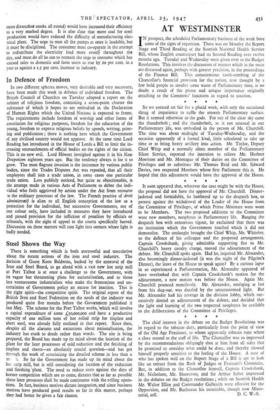AT WESTMINSTER I N prospect, the scheduled Parliamentary business of the
week bore some of the signs of repetition. There was on Monday the Report Stage and Third Reading of the Scottish National Health Service Bill, whose English counterpart had its Second Reading over twelve months ago. Tuesday and Wednesday were given over to the Budget Resolutions. This involves the discussion of matters which in the main are discussed again, perhaps with greater precision, in the proceedings of the Finance Bill. This conscientious tooth-combing of the Chancellor's financial provision for the nation, now thought by a few bold people to involve some waste of Parliamentary time, is no doubt a result of the prime and unique importance originally attaching to the Commons' functions in regard to taxation.
* * * * So we seemed set fair for a placid week, with only the occasional shrug of impatience to ruffle the smooth Parliamentary surface. But it seemed otherwise to the gods. For out of the clear sky came the thunderbolt ; and the thunderbolt, as is not unusual. in our Parliamentary life, was embodied in the person of Mr. Churchill. The time was about midnight of Tuesday-Wednesday, and the occasion apparently of a formal kind, little calculated to take up time or to bring, heavy artillery into action. Mr. Taylor, Deputy Chief Whip and a normally silent member of the Parliamentary Silent Service, reported the intention to relieve Mr. Herbert Morrison and Mr. Montague of their duties on the Committee of Privileges and to substitute Mr. Thomas Reid and Mr. Edward Davies, two respected Members whose first Parliament this is. He hoped that this adjustment would have the approval of the House.
* * * * It soon appeared that, whatever the case might be with the House, the proposal did not have the approval of Mr. Churchill. Dinner- jacketed and formidable, he lumbered up to the despatch box, to protest against the withdrawal of the Leader of the House from the Committee of Privileges, of which Prime Ministers were wont to be Members. The two proposed additions to the Committee were new members, neophytes in Parliamentary life. Banging the despatch box with censorious vigour, he exclaimed that there was no institution which the Government touched which it did not demoralise. The onslaught brought the Chief Whip, Mr. Whiteley, to the defence of his colleague and the proposed arrangement. Captain Crookshank, giving admirable supporting fire to Mr. Churchill's heavy cavalry charge, moved the adjournment of the debate. Mr. Churchill spoke again. Had he, inquired Mr. Alexander, also becomingly dinner-jacketed (it was the night of the Pilgrim's Dinner), the leave of the House to speak again? By a curious lapse in so experienced a Parliamentarian, Mr. Alexander appeared td have overlooked that with Captain Crookshank's motion for the adjournment, a new motion was before the House. Again Mr. Churchill pounced mercilessly. Mr. Alexander, emerging at last from his dug-out, was dazzled by the unaccustomed light. But Mr. Alexander had his revenge in the division lobby, which suc- cessively denied an adjournment of the debate, and decided that the light and learning of the two respected neophytes be available to the deliberations of the Committee of Privileges.
* * * * The chief interest in the debate on the Budget Resolutions was in regard to the tobacco duty, particularly from the point of view of the Old Age Pensioner, to whom apparently tobacco runs wheat a close second as the staff of life. The Chancellor was so impressed by the recommendations obligingly shot at him from all sides that he promised to consider what could be done, and thereby showed himself properly sensitive to the feeling of the House. A note of who has spoken well on the Report Stage of a Bill is apt to look like an extract from the Book of Judges or Froissart's Chronicles. But, in addition to the Chancellor himself, Captain Crookshank, Mr. Nicholson, Mr. Shawcross, and Sir Arthur Salter impressed in the debates on the Budget resolutions ; while on Scottish Health Mr. Walter Elliot and Commander Galbraith were effective for the Opposition, and Mr. Buchanan his inimitable, though now Minis-


































 Previous page
Previous page